
Trafalgar is a 1971 album by the Bee Gees. It was their ninth album, and was released in September 1971 in the US, and November 1971 in the UK. The album was a moderate hit in the United States, and peaked at No. 34. The lead single "How Can You Mend a Broken Heart?" was the first Bee Gees' No. 1 single in the United States but failed to chart in Britain as did the album. It is Geoff Bridgford's only full-length appearance on a Bee Gees album as an official member.
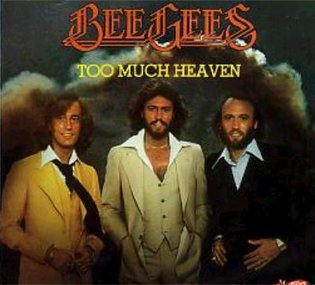
"Too Much Heaven" is a song by the Bee Gees, which was the band's contribution to the "Music for UNICEF" fund. They performed it at the Music for UNICEF Concert on 9 January 1979. The song later found its way to the group's thirteenth original album, Spirits Having Flown. It hit No. 1 in both the US and Canada. In the United States, the song was the first single out of three from the album to interrupt a song's stay at #1. "Too Much Heaven" knocked "Le Freak" off the top spot for two weeks before "Le Freak" returned to #1 again. "Too Much Heaven" also rose to the top three in the UK. In the US, it would become the fourth of six consecutive No. 1s, equaling the record set by Bing Crosby, Elvis Presley, and the Beatles for the most consecutive No. 1 songs. The six Bee Gee songs are "How Deep Is Your Love", "Stayin' Alive", "Night Fever", "Too Much Heaven", "Tragedy" and "Love You Inside Out". The songs spanned the years of 1977, 1978 and 1979.

"Love You Inside Out" is a 1979 single by the Bee Gees from their album, Spirits Having Flown. It was their last chart-topping single on the Billboard Hot 100, interrupting Donna Summer's "Hot Stuff", becoming the third single from the album to do so. In the UK, the single peaked at No. 13 for two weeks. It was the ninth and final number-one hit for the Bee Gees in the US, and the twelfth and final number-one hit in Canada as well. The trio would not return to the top 10 for ten years, with the song, "One".
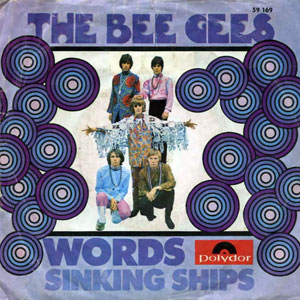
"Words" is a song by the Bee Gees, written by Barry, Robin, and Maurice Gibb. The song reached No. 1 in Germany, Canada, Switzerland, and the Netherlands.
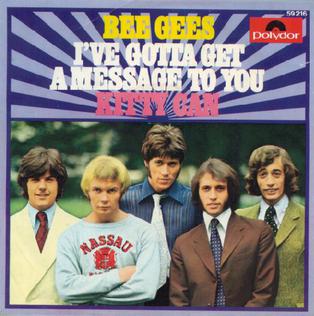
"I've Gotta Get a Message to You" is a song by the Bee Gees. Released as a single in 1968, it was their second number-one hit in the UK Singles Chart, and their first US Top 10 hit. Barry Gibb re-recorded the song with Keith Urban for his 2021 album Greenfields.

"How Can You Mend a Broken Heart" is a song released by the Bee Gees in 1971. It was written by Barry and Robin Gibb and was the first single on the group's 1971 album Trafalgar. It was their first US No. 1 single and also reached No. 1 in Cashbox magazine for two weeks.
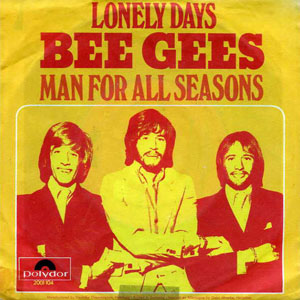
"Lonely Days" is a ballad written and performed by the Bee Gees. It appeared on their album 2 Years On, and was released as a single, becoming their first Top Five hit in the US, peaking at number three in the Billboard Hot 100 and reaching number one in the Cashbox and Record World charts. Barry Gibb later re-recorded the song with country quartet Little Big Town for his 2021 album Greenfields.
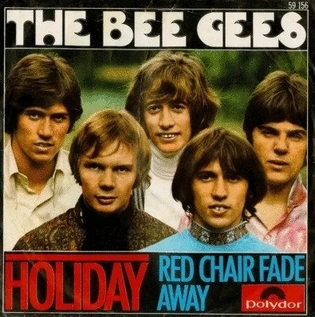
"Holiday" is a song released by the Bee Gees in the United States in September 1967. It appeared on the album Bee Gees' 1st. The song was not released as a single in their native United Kingdom because Polydor UK released the single "World" from their next album Horizontal.

"Don't Forget to Remember" also called "Don't Forget to Remember Me" is a country ballad recorded by the Bee Gees, from the album Cucumber Castle. The song was written by Barry and Maurice Gibb. It was produced by the band with Robert Stigwood.

"First of May" is a song by the Bee Gees with lead vocals by Barry Gibb, released as a single from their 1969 double album Odessa. Its B-side was "Lamplight". It also featured as the B-side of "Melody Fair" when that song was released as a single in the Far East in 1971 as well as in 1976 and 1980 on RSO Records. It was the first Bee Gees single to be released after lead guitarist Vince Melouney had left the group.

"Mr. Natural" is a song by the Bee Gees, written by Barry and Robin Gibb. On 29 March 1974, it was released as a single and also released on the album of the same name in 1974. It was backed with a folk rock number "It Doesn't Matter Much to Me". The group's first single which was produced by Arif Mardin.

"My World" is a 1972 single released by the Bee Gees. It was originally released as a non-album single on 14 January 1972 worldwide. but was later included on the compilation Best of Bee Gees, Volume 2 in 1973. The flip side of the single was "On Time", a country rock number composed by Maurice Gibb. "My World" reached the Top 20 in both US and UK.

"Run to Me" is a song by the Bee Gees, the lead single from the group's album To Whom It May Concern (1972). The song reached the UK Top 10 and the US Top 20.
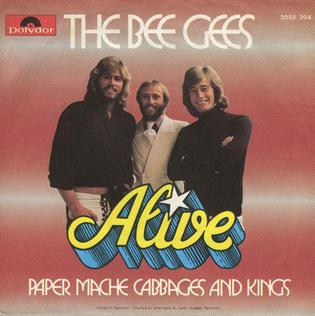
"Alive" is a ballad recorded by the Bee Gees for their album To Whom It May Concern. It was the second and last single from the album released on 10 November 1972 worldwide. The song was credited to Barry and Maurice Gibb and produced by the Gibbs and their manager Robert Stigwood.
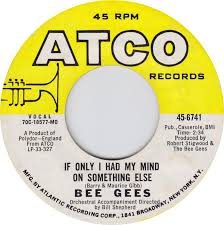
"If Only I Had My Mind on Something Else" is a pop ballad recorded by the Bee Gees. It was written by Barry and Maurice Gibb. It was the first track on the album Cucumber Castle. A remastered version was released in 1990 on Tales from the Brothers Gibb.

"Fanny (Be Tender with My Love)" is a song written and performed by the Bee Gees for their Main Course album in 1975. It was the third single release from the album, peaking at number 12 on the United States Billboard Hot 100 and number two in Canada. According to Maurice Gibb, producer Quincy Jones called "Fanny" one of his favorite R&B songs of all time.
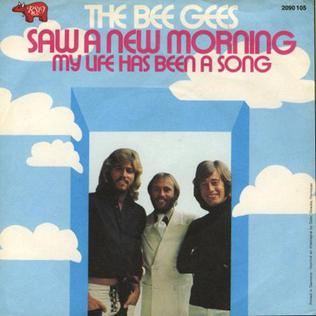
"Saw a New Morning" is the 1973 single released by the Bee Gees. It was also the group's first single released on Robert Stigwood's newly created records label RSO Records. The Bee Gees moved to Los Angeles in 1972 to record the album Life in a Tin Can which was a new direction for the group, who had been recording in England since 1967. The B-side, "My Life Has Been a Song" features lead vocal by Robin Gibb as well as Barry Gibb.

"(Our Love) Don't Throw It All Away" is a song penned by Barry Gibb and Blue Weaver and recorded by the Bee Gees in 1977 on the Saturday Night Fever sessions but was not released until Bee Gees Greatest (1979). A different version was released in September 1978 by RSO Records as the third single by Andy Gibb from his second studio album Shadow Dancing. His version was produced by Gibb-Galuten-Richardson.

"Country Woman" is a song written and released by British rock band Bee Gees. It was written and performed solely by Maurice Gibb, and released as a B-side of "How Can You Mend a Broken Heart", which was the group's first US No. 1. The songs were released as a double A-side in Germany, France, Japan and Canada.

"Israel" is a ballad track written by Barry Gibb. It appeared on the Bee Gees' 1971 album, Trafalgar.



















